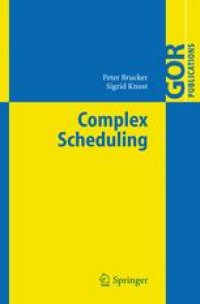
Ebook: Complex Scheduling
- Series: GOR ┠Publications
- Year: 2006
- Publisher: Springer Berlin Heidelberg
- Language: English
- pdf
This book presents models and algorithms for complex scheduling problems. Besides resource-constrained project scheduling problems with applications also job-shop problems with flexible machines, transportation or limited buffers are discussed. Discrete optimization methods like linear and integer programming, constraint propagation techniques, shortest path and network flow algorithms, branch-and-bound methods, local search and genetic algorithms, and dynamic programming are presented. They are used in exact or heuristic procedures to solve the introduced complex scheduling problems. Furthermore, methods for calculating lower bounds are described. Most algorithms are formulated in detail and illustrated with examples.
This book presents models and algorithms for complex scheduling problems. Besides resource-constrained project scheduling problems with applications also job-shop problems with flexible machines, transportation or limited buffers are discussed. Discrete optimization methods like linear and integer programming, constraint propagation techniques, shortest path and network flow algorithms, branch-and-bound methods, local search and genetic algorithms, and dynamic programming are presented. They are used in exact or heuristic procedures to solve the introduced complex scheduling problems. Furthermore, methods for calculating lower bounds are described. Most algorithms are formulated in detail and illustrated with examples.
Content:
Front Matter....Pages i-x
Scheduling Models....Pages 1-22
Algorithms and Complexity....Pages 23-90
Resource-Constrained Project Scheduling....Pages 91-188
Complex Job-Shop Scheduling....Pages 189-267
Back Matter....Pages 269-284
This book presents models and algorithms for complex scheduling problems. Besides resource-constrained project scheduling problems with applications also job-shop problems with flexible machines, transportation or limited buffers are discussed. Discrete optimization methods like linear and integer programming, constraint propagation techniques, shortest path and network flow algorithms, branch-and-bound methods, local search and genetic algorithms, and dynamic programming are presented. They are used in exact or heuristic procedures to solve the introduced complex scheduling problems. Furthermore, methods for calculating lower bounds are described. Most algorithms are formulated in detail and illustrated with examples.
Content:
Front Matter....Pages i-x
Scheduling Models....Pages 1-22
Algorithms and Complexity....Pages 23-90
Resource-Constrained Project Scheduling....Pages 91-188
Complex Job-Shop Scheduling....Pages 189-267
Back Matter....Pages 269-284
....